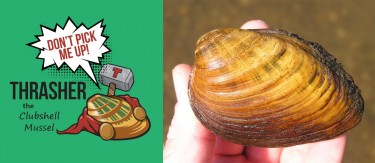 My name’s Thrasher, the Clubshell Mussel and I’m the mussel… muscle of this team. My message is DO NOT PICK ME UP! Why? Because it is illegal to remove any mussel (dead or alive) from lakes, streams, and rivers. During the 19th and 20th centuries throughout the Midwest, mussels were harvested by the millions for commercial button and jewelry making. Unfortunately, this industry decreased our population numbers significantly so now we are protected. With all of the efforts from conservationists and others, things are looking brighter for mussels.Help us to remain strong within your lakes, streams, and rivers and DON’T PICK ME UP!
My name’s Thrasher, the Clubshell Mussel and I’m the mussel… muscle of this team. My message is DO NOT PICK ME UP! Why? Because it is illegal to remove any mussel (dead or alive) from lakes, streams, and rivers. During the 19th and 20th centuries throughout the Midwest, mussels were harvested by the millions for commercial button and jewelry making. Unfortunately, this industry decreased our population numbers significantly so now we are protected. With all of the efforts from conservationists and others, things are looking brighter for mussels.Help us to remain strong within your lakes, streams, and rivers and DON’T PICK ME UP!
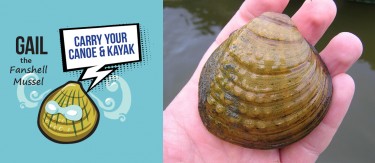 Hello, my name is Gail, the Fanshell Mussel. It’s a pleasure to meet you. Did you know that by dragging your canoe, kayak, or other watercraft along the bottom of areas of low water that you can injure mussels? It is important to save the mighty mussels and CARRY YOUR CANOE/KAYAK! Even though we mussels may not be much to look at, we do our part to keep our home pristine and beautiful. Very much like oysters, the particles that we take in, allows some freshwater mussel species to produce pearls. By working together we can create something beautiful for everyone to enjoy!
Hello, my name is Gail, the Fanshell Mussel. It’s a pleasure to meet you. Did you know that by dragging your canoe, kayak, or other watercraft along the bottom of areas of low water that you can injure mussels? It is important to save the mighty mussels and CARRY YOUR CANOE/KAYAK! Even though we mussels may not be much to look at, we do our part to keep our home pristine and beautiful. Very much like oysters, the particles that we take in, allows some freshwater mussel species to produce pearls. By working together we can create something beautiful for everyone to enjoy!
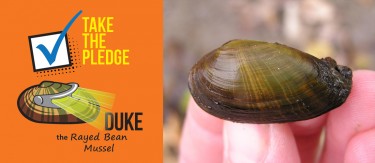 Hello! My name is Duke, the Rayed Bean Mussel, and I would like you to TAKE THE PLEDGE to improve water quality and protect mussel habitat for your mighty mussels! Pledge to leave all mussels in the water where you find them (DON’T PICK ME UP!), carry your canoe or kayak, and collect and properly dispose all of your trash (DON’T LITTER!) Anyone can do it…property owners, anglers, recreationists, etc. Even if you don’t live in Indiana, as long as you recreate in or along the Tippecanoe River, we would like your support in taking the pledge also.
Hello! My name is Duke, the Rayed Bean Mussel, and I would like you to TAKE THE PLEDGE to improve water quality and protect mussel habitat for your mighty mussels! Pledge to leave all mussels in the water where you find them (DON’T PICK ME UP!), carry your canoe or kayak, and collect and properly dispose all of your trash (DON’T LITTER!) Anyone can do it…property owners, anglers, recreationists, etc. Even if you don’t live in Indiana, as long as you recreate in or along the Tippecanoe River, we would like your support in taking the pledge also.
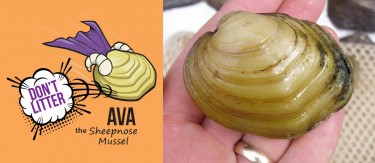 Wow! Aren’t watersheds exciting?! I am Ava, the Sheepnose Mussel. Do you know what an indicator species is? An indicator species has certain qualities that make them important for scientists to study. The presence or absence of an indicator species often reveals the quality of the environmental it lives in. Mussels are an indicator of high water quality so if you see us in streams and rivers, you will know the water has little pollution. We can also tell a lot more than just if our home, the water, is polluted. Through filter feeding, we take pollution into our bodies and by taking samples of our tissues, scientists can tell what kind of pollution is in the water, how much of it there is, and how long it’s been there! So please keep us healthy and DON’T LITTER! Collect and properly dispose of all of your trash when you are enjoying the beautiful lakes, streams, and rivers. Remember HEALTHY MUSSELS, HEALTHY RIVER!
Wow! Aren’t watersheds exciting?! I am Ava, the Sheepnose Mussel. Do you know what an indicator species is? An indicator species has certain qualities that make them important for scientists to study. The presence or absence of an indicator species often reveals the quality of the environmental it lives in. Mussels are an indicator of high water quality so if you see us in streams and rivers, you will know the water has little pollution. We can also tell a lot more than just if our home, the water, is polluted. Through filter feeding, we take pollution into our bodies and by taking samples of our tissues, scientists can tell what kind of pollution is in the water, how much of it there is, and how long it’s been there! So please keep us healthy and DON’T LITTER! Collect and properly dispose of all of your trash when you are enjoying the beautiful lakes, streams, and rivers. Remember HEALTHY MUSSELS, HEALTHY RIVER!
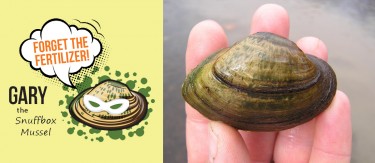 Hey there! The name’s Gary and I am a Snuffbox Mussel. Please protect the mighty mussels and FORGET THE FERTILIZER – and protect shorelines from erosion! Mussels are great filter feeders that can filter up to 10 gallons of water per day. We feed on the microscopic organisms in the water and also help clean the water in which we live. If the water is polluted, it becomes harmful to your mighty mussels. So please reduce fertilizer use on your lawn and stabilize your shorelines by planting native plants to prevent extra nutrients and sediment from running off your yard to the river. Please help the mighty mussels stay healthy to keep the Tippecanoe River clean! HEALTHY MUSSELS, HEALTHY RIVER!
Hey there! The name’s Gary and I am a Snuffbox Mussel. Please protect the mighty mussels and FORGET THE FERTILIZER – and protect shorelines from erosion! Mussels are great filter feeders that can filter up to 10 gallons of water per day. We feed on the microscopic organisms in the water and also help clean the water in which we live. If the water is polluted, it becomes harmful to your mighty mussels. So please reduce fertilizer use on your lawn and stabilize your shorelines by planting native plants to prevent extra nutrients and sediment from running off your yard to the river. Please help the mighty mussels stay healthy to keep the Tippecanoe River clean! HEALTHY MUSSELS, HEALTHY RIVER!
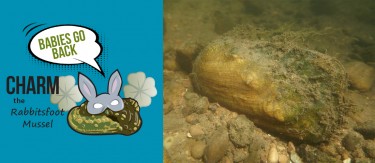 And I am Charm, the Rabbitsfoot Mussel! I say BABIES GO BACK! Did you know that mussels need fish to make baby mussels? Fertilized mussel eggs are called glochidia and glochidia (or baby mussels) attach to fish gills and live there until they are big enough to exist on their own, without hurting the fish. So if you catch a fish from the Tippecanoe River, please check the gills. If you see little white specks on the gills that look like grains of salt, release the fish (and baby mussels) back into the water so we can grow and become mighty mussels. BABIES GO BACK!
And I am Charm, the Rabbitsfoot Mussel! I say BABIES GO BACK! Did you know that mussels need fish to make baby mussels? Fertilized mussel eggs are called glochidia and glochidia (or baby mussels) attach to fish gills and live there until they are big enough to exist on their own, without hurting the fish. So if you catch a fish from the Tippecanoe River, please check the gills. If you see little white specks on the gills that look like grains of salt, release the fish (and baby mussels) back into the water so we can grow and become mighty mussels. BABIES GO BACK!
All mussel photos were taken by Indiana DNR staff with appropriate permits and permissions.

